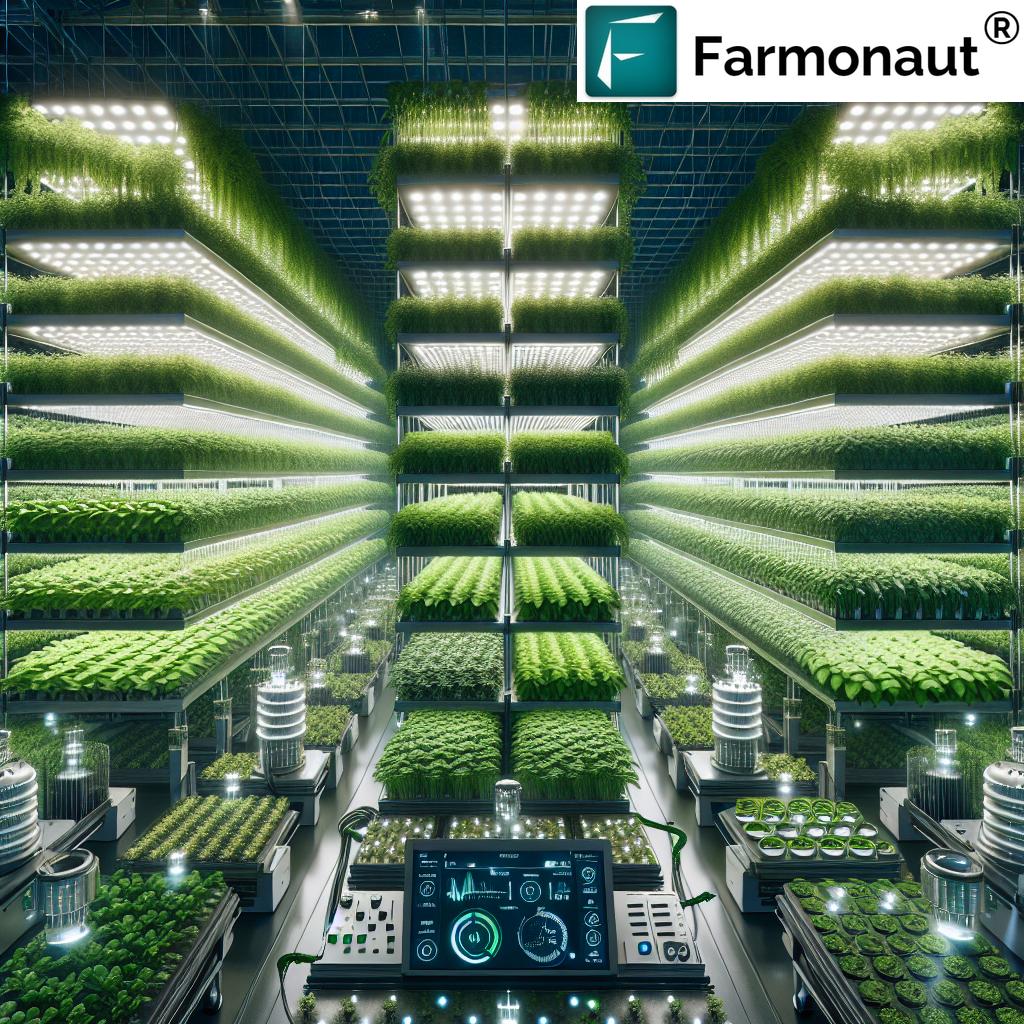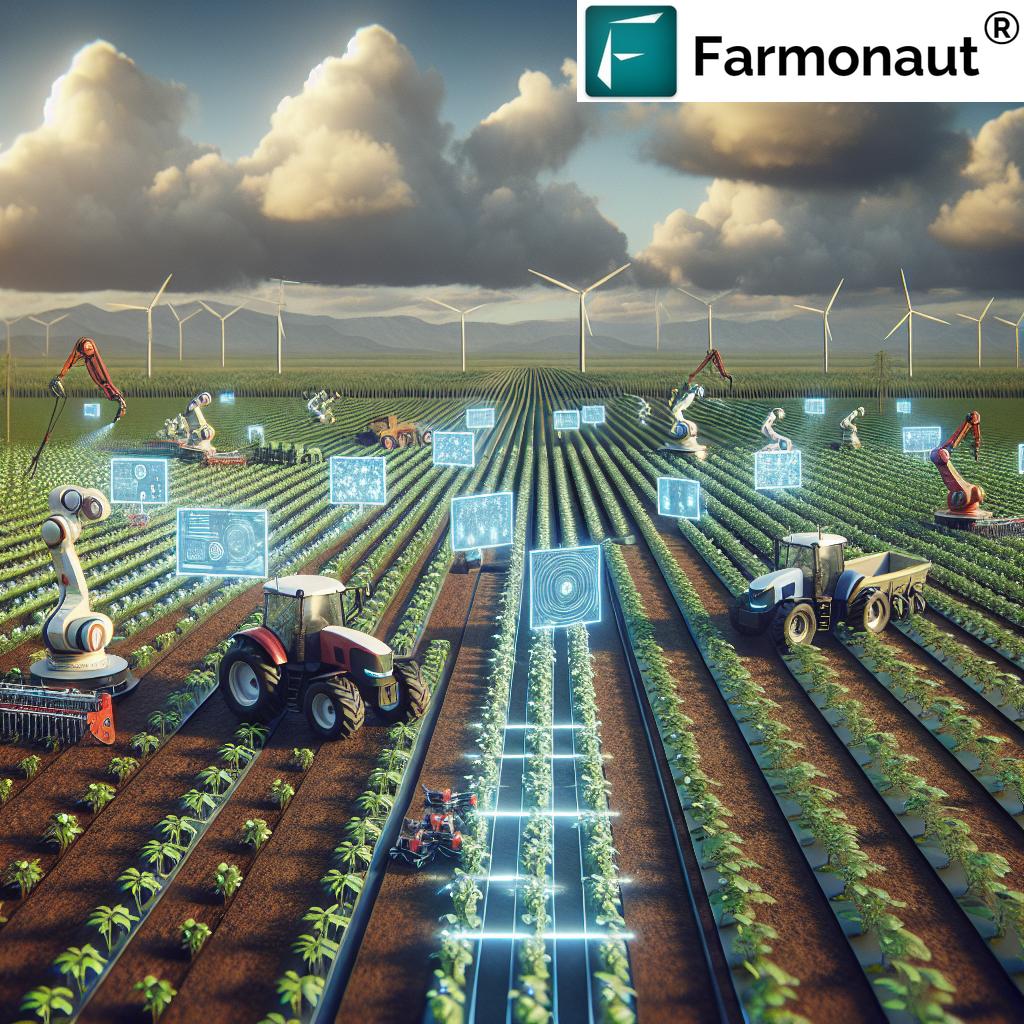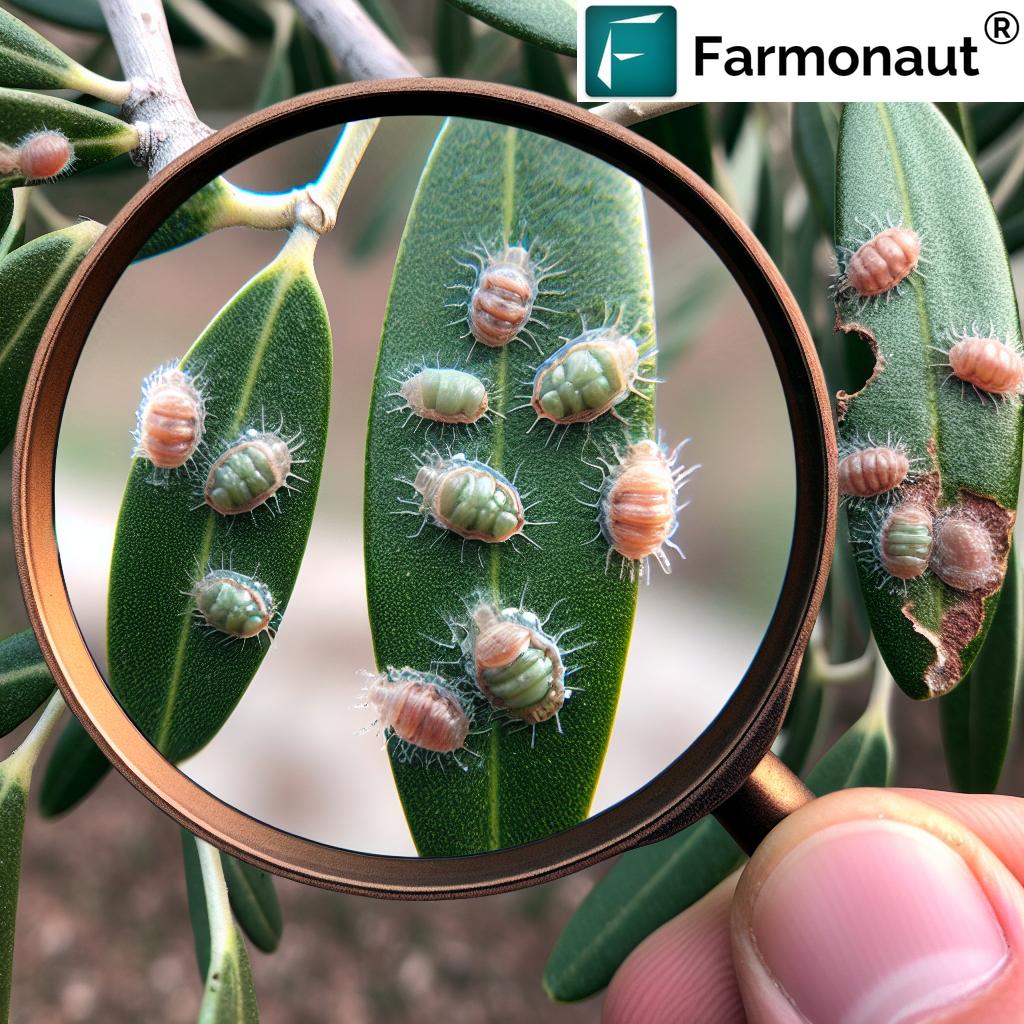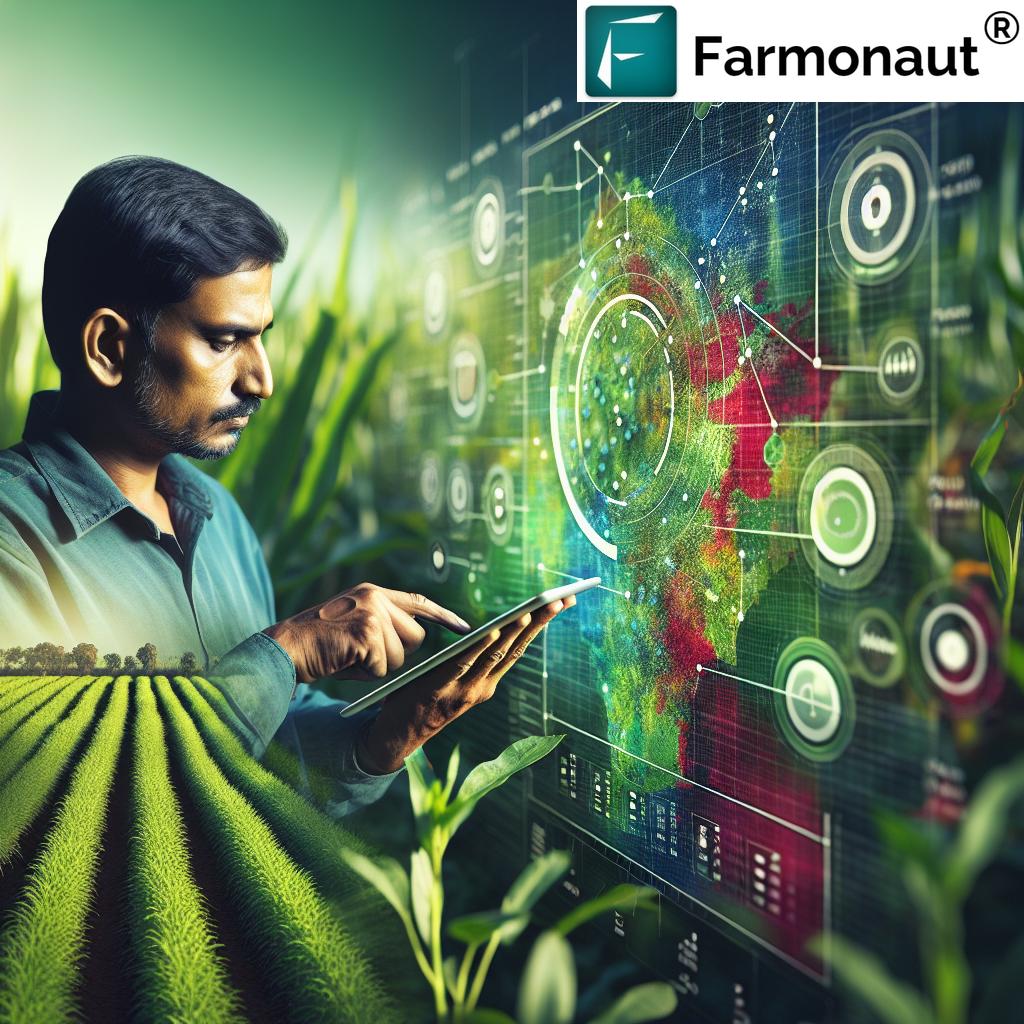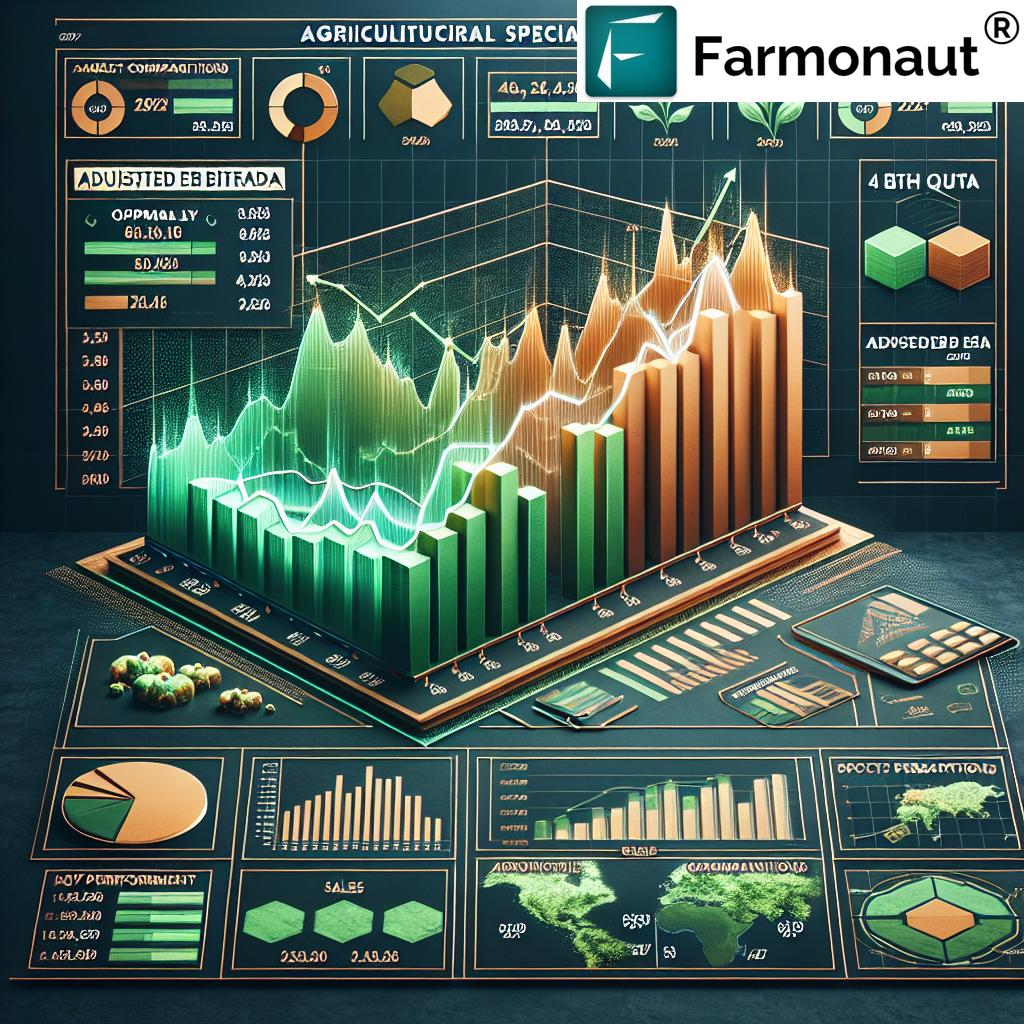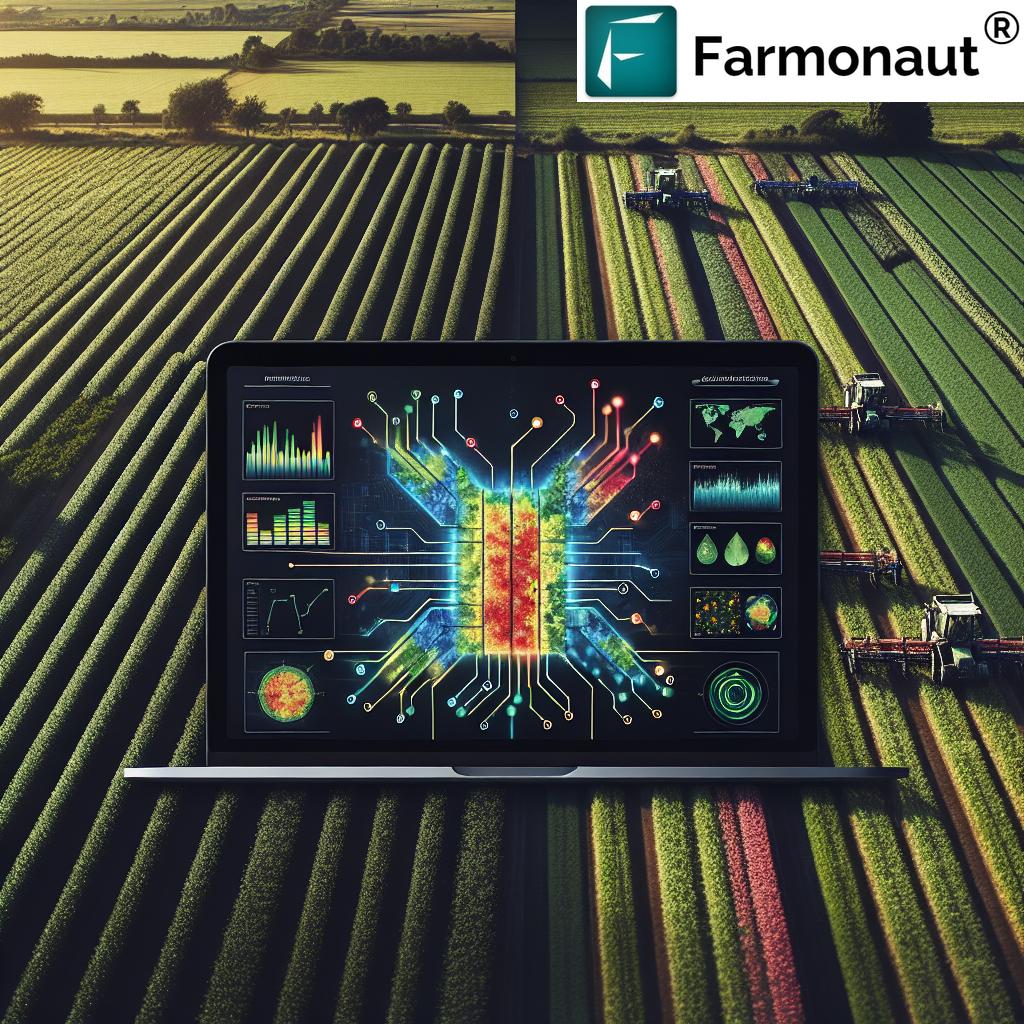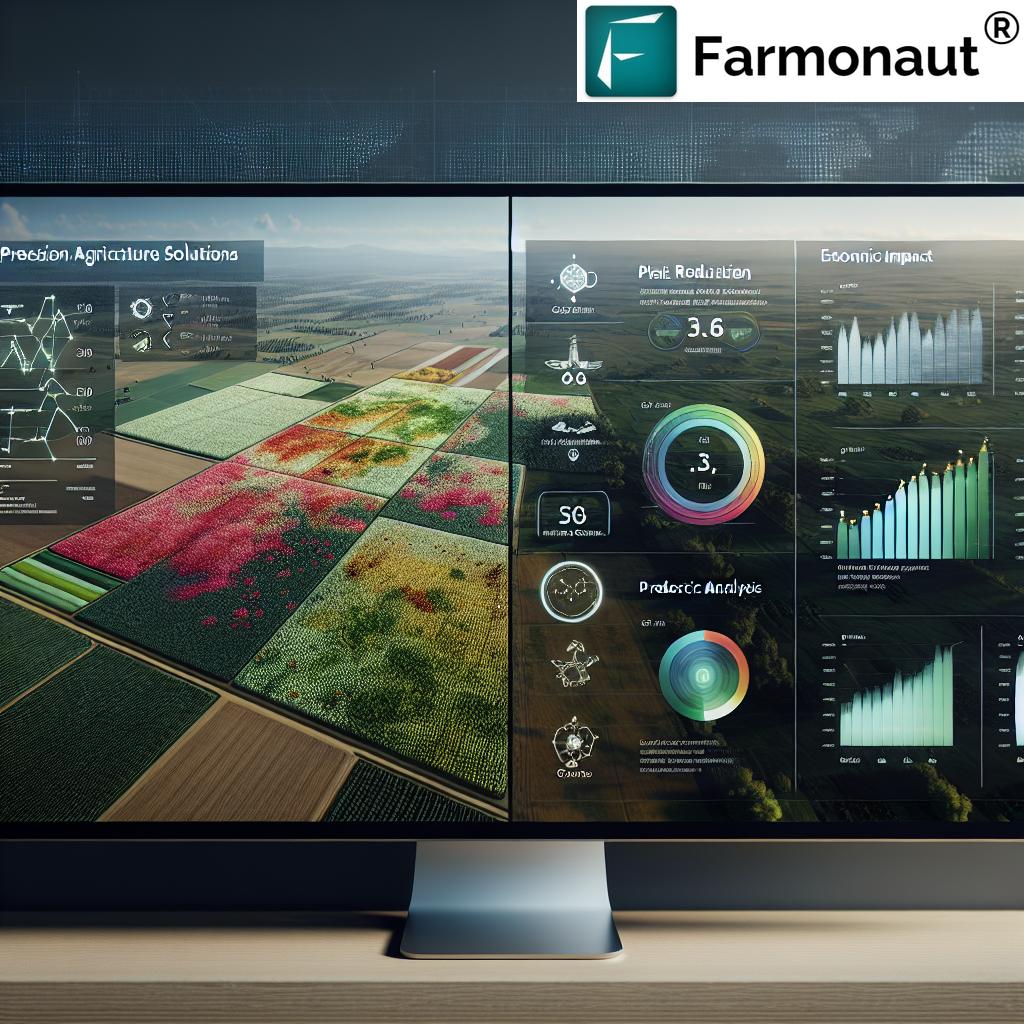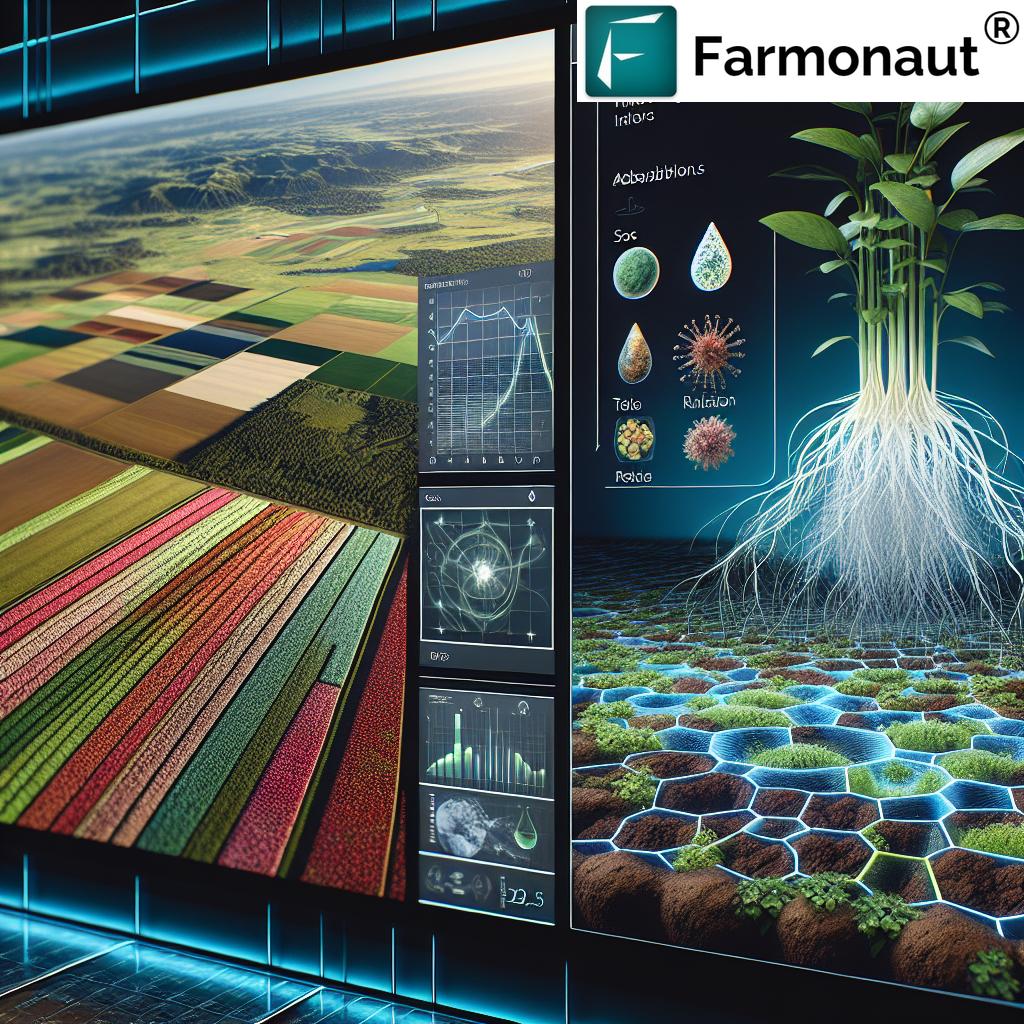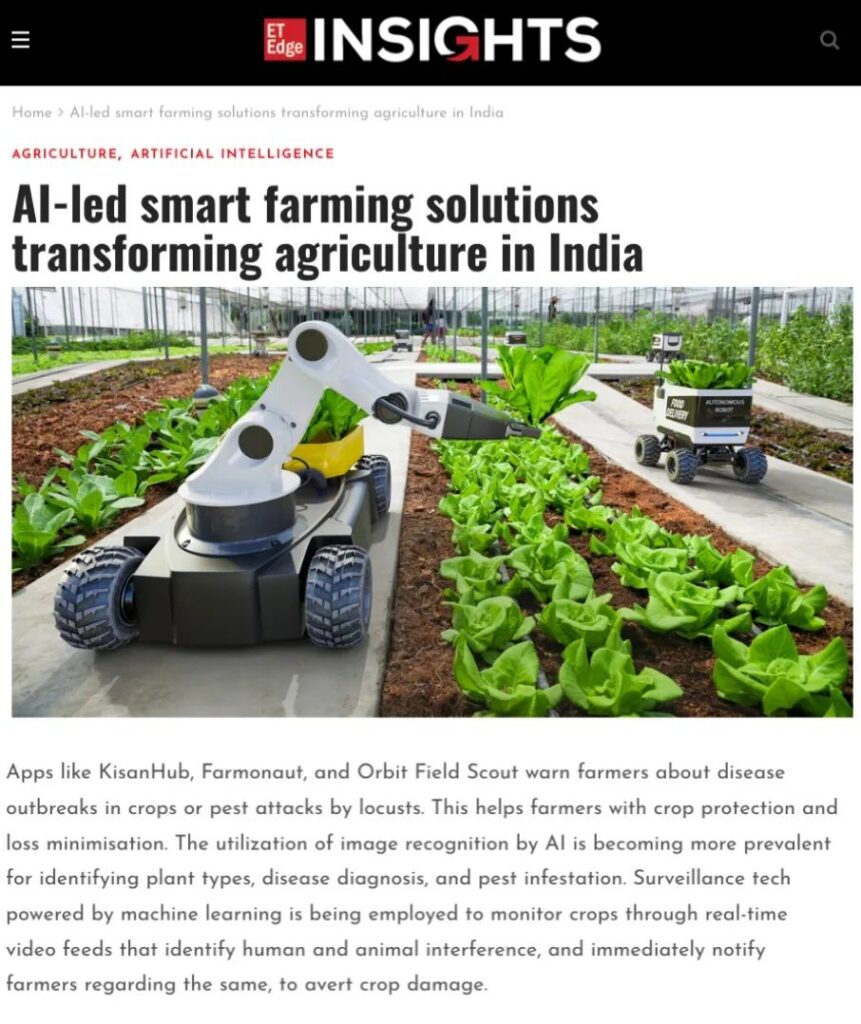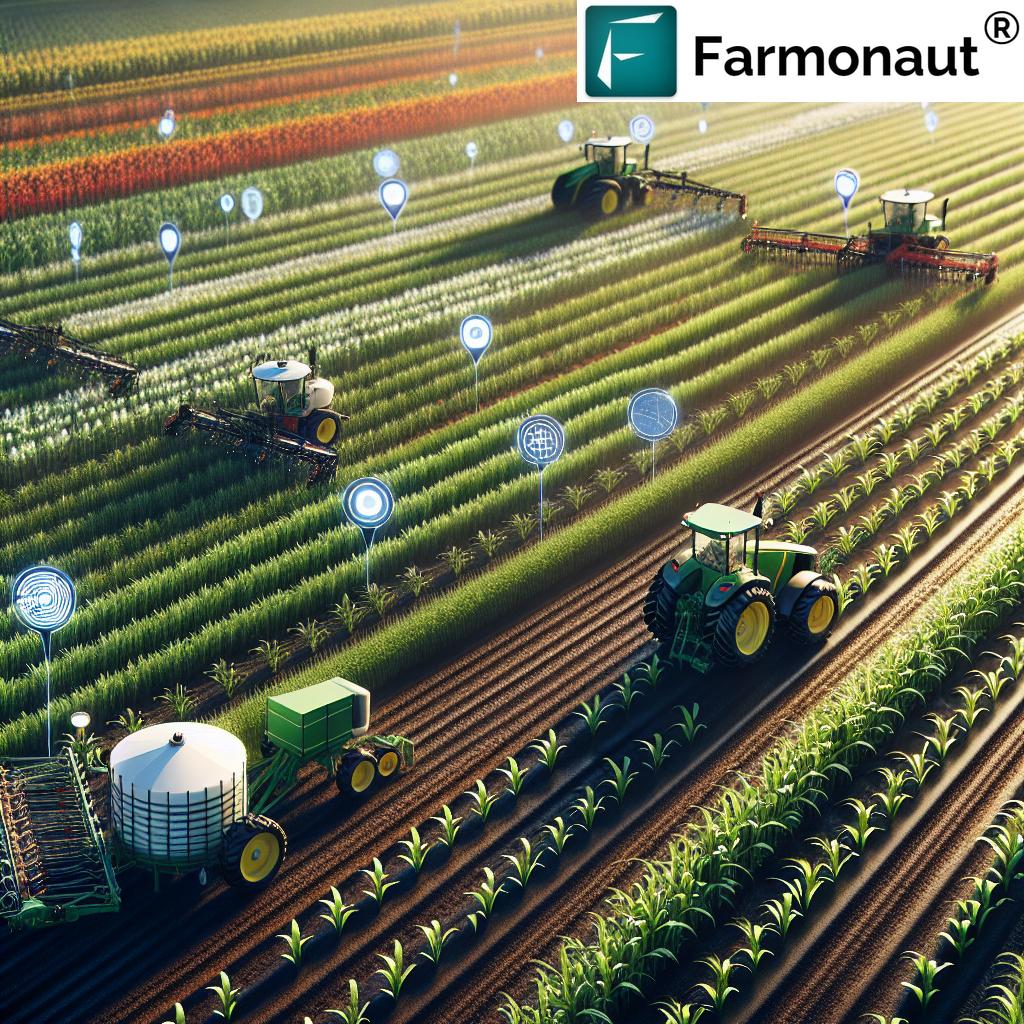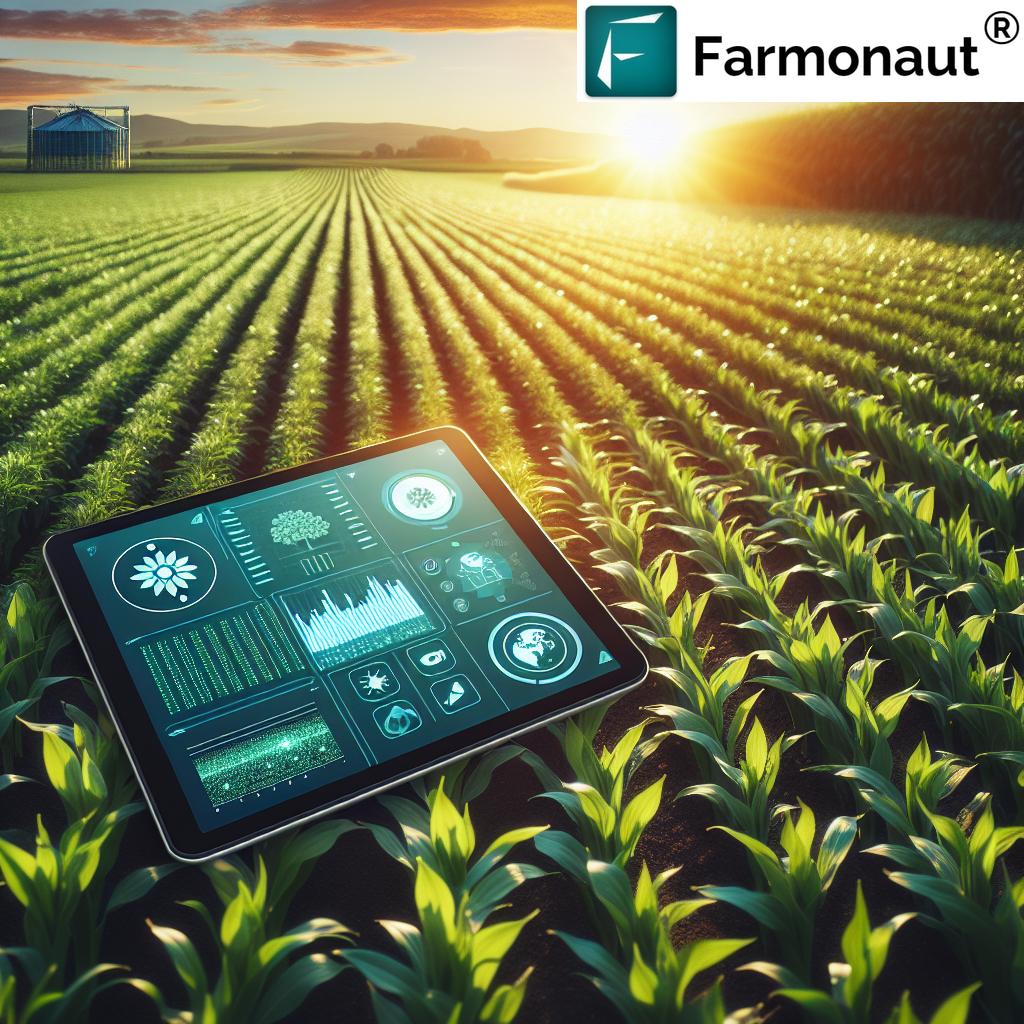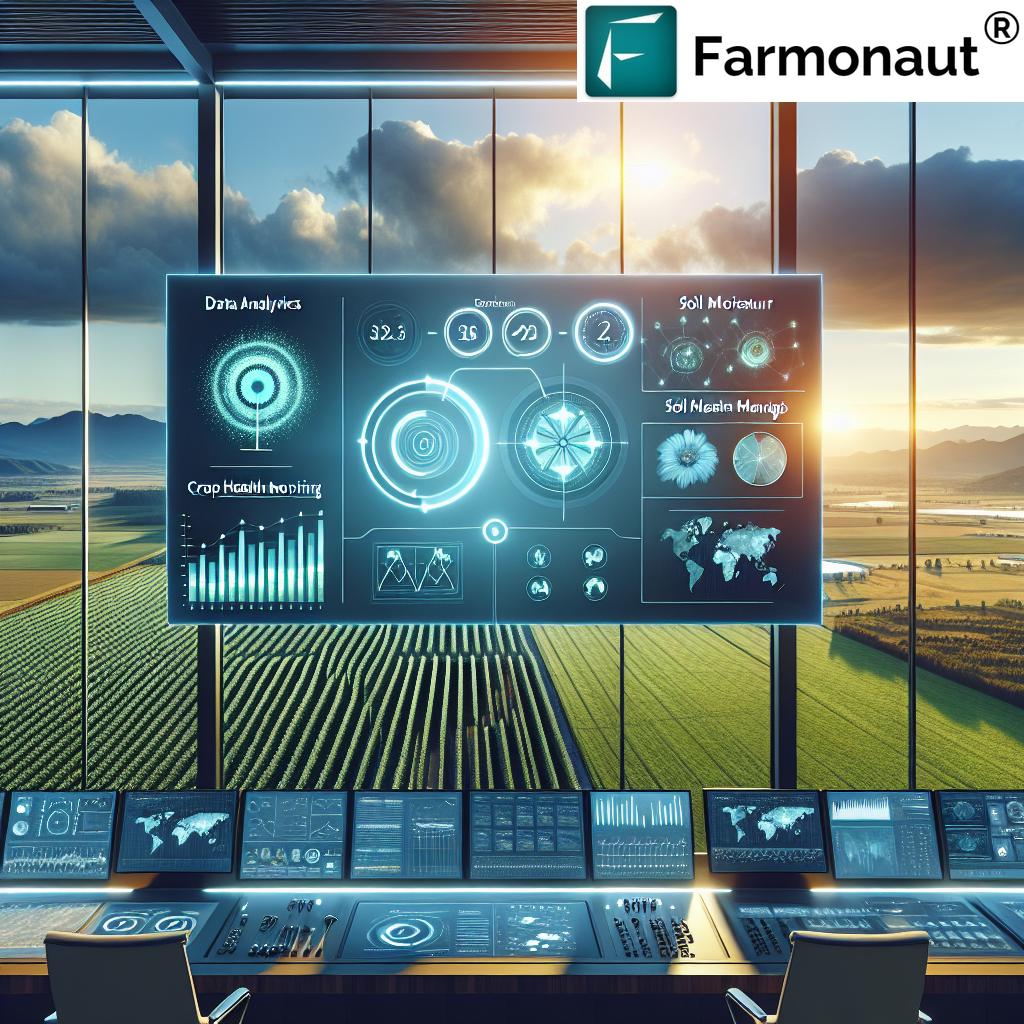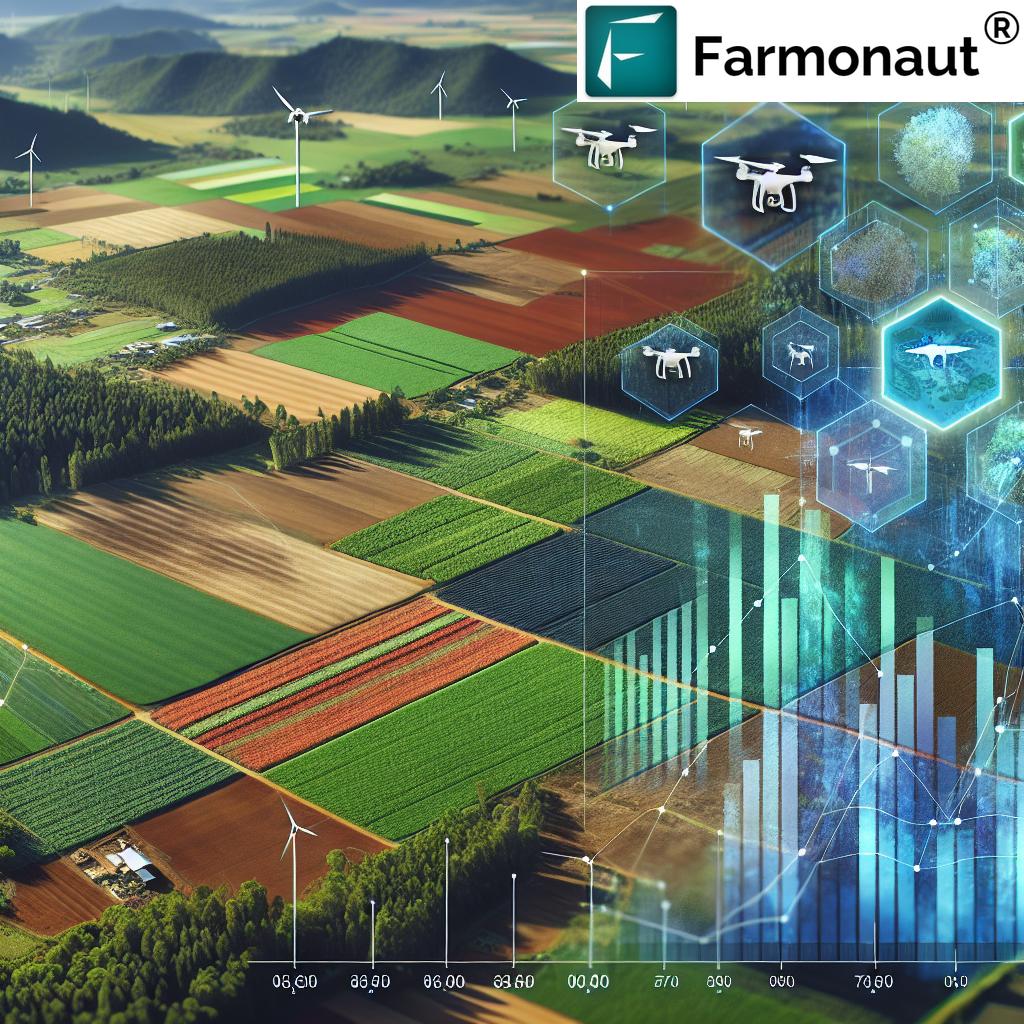7 Ag Technology Secrets Revolutionizing Farming Now
Meta Description: Agricultural technology is rapidly transforming farming with precision agriculture, AI in agriculture, and sustainable innovations, ensuring higher yields and a resilient, eco-friendly future. Discover these secrets now!
“AI-powered precision agriculture can increase crop yields by up to 30% compared to traditional farming methods.”
Table of Contents
- Introduction: The Dawn of Smart Farming Solutions
- 1. Precision Agriculture: Data-Driven Farming for the Future
- 2. Automation and Robotics: The New Workhorses of Modern Agriculture
- 3. AI and Machine Learning: Insightful Decisions, Enhanced Yields
- 4. Biotechnology and Genetic Engineering: Charting the Course for Resilient Crops
- 5. Controlled-Environment Agriculture (CEA) & Vertical Farming Systems
- 6. Nanotechnology: Precision Tools at the Nanoscale
- 7. Blockchain in Agriculture: Trust, Traceability, & Transparency
- Farmonaut’s Role in Advancing AgTech Innovations
- Comparative Impact Table: Ag Technology Innovations at a Glance
- Bonus: IoT, Sustainability, and the Path Forward
- Frequently Asked Questions (FAQ)
- Conclusion: Shaping the Future of Agricultural Technology
Introduction: The Dawn of Smart Farming Solutions
Agricultural technology (AgTech) stands at the forefront of a new era in farming, reshaping our sector with astonishing speed and breadth. As farmers, agribusinesses, and consumers navigate the escalating demands for food security, sustainability, and efficiency, we must embrace, understand, and harness technologies revolutionizing agriculture and forestry. From precision agriculture to machine learning and blockchain in agriculture, these technologies offer actionable pathways to maximize crop yields, optimize resource consumption, and build resilience against increasingly volatile climate conditions.
Our focus in this blog is to uncover the seven game-changing agricultural technology secrets that are revolutionizing modern (2025 and beyond!) farming practices. We’ll explore how satellite-powered crop health monitoring apps from innovative companies like Farmonaut democratize precision agriculture, and how advances in AI in agriculture, robotics, and other agtech innovations promise real, tangible improvements in sustainability, productivity, and quality.
These cutting-edge tools aren’t just future promises. They’re here, working for us now—boosting efficiency, ensuring global food security, and leading the transformation to sustainable farming practices.
1. Precision Agriculture: Data-Driven Farming for the Future
Precision agriculture is the backbone of smart farming solutions, leveraging advanced data, sensors, and analytics to make informed, targeted decisions on the field. With population growth, fluctuating weather patterns, and increasing environmental concerns, it’s imperative for us to maximize resource use while minimizing waste and environmental impact. Precision agriculture does just that.
- Real-Time Soil and Crop Monitoring: With on-ground and satellite sensors, we can monitor soil health, moisture, crop condition, and diseases across every meter of a field.
- Targeted Interventions and Inputs: Instead of uniform fertilization and irrigation, precision ag lets us deploy precise input doses matched to exact field requirements—saving water, fertilizer, and energy.
- Yield Optimization: Identifying underperforming zones, adjusting interventions, and ultimately maximizing crop yields.
A great example is Farmonaut’s satellite-based platform, which grants every farmer—whether in fields or behind a desk—access to satellite imagery for real-time crop health assessment, soil moisture monitoring, and predictive analytics for upcoming weather and disease risk.
Smart irrigation systems can autonomously deliver water precisely where and when it’s needed, conserving up to 50% more water compared to traditional methods. To learn how to implement cutting-edge resource optimization or to get satellite-powered field monitoring, explore Farmonaut’s API and check large scale farm management solutions.
Benefits of Precision Agriculture
- Higher crop yields with lower resource consumption
- Early detection of diseases, pests, and nutrient deficiencies
- Increased farm productivity and profitability
- Strengthened climate resilience
- Supports environmental sustainability goals
2. Automation and Robotics: The New Workhorses of Modern Agriculture
In a world where labor shortages are commonplace and efficiency is critical, automation in agriculture is rapidly redefining field operations. Today’s autonomous machinery—from self-driving tractors to robotic harvesters—are equipped with sensors, GPS, and AI to deliver precision in tasks such as planting, weeding, and harvesting.
- Labor Optimization: Automation reduces reliance on manual labor while increasing operational efficiency.
- Uniform Quality: Consistent and accurate performance ensures higher produce quality and fewer losses.
- Increased Working Hours: Machines can operate around the clock, optimizing time-critical agricultural processes.
Modern robotics can even tackle targeted weeding, reducing the need for herbicides and improving soil health. Platforms like Farmonaut’s Fleet and Resource Management tool ensure all autonomous machinery and vehicles are efficiently tracked, reducing costs and maximizing uptime.
Challenges and Considerations
- The need for skilled labor to operate and maintain new systems
- Potential job displacement—upselling the importance of reskilling and digital literacy
- Initial investment costs
Modern automation isn’t just about machinery. Farmonaut’s solutions for fleet management also support optimization for human operators, improving logistics and ensuring efficient resource allocation across large-scale operations.
3. AI and Machine Learning: Insightful Decisions, Enhanced Yields
AI in agriculture is no longer a futuristic concept—it’s at the heart of large and small farms, revolutionizing how we make decisions. Machine learning algorithms analyze massive datasets gathered from sensors, satellites, drones, and IoT devices to uncover actionable patterns. Whether it’s predicting crop yields, identifying plant stress before it becomes visible, or managing pest outbreaks, AI empowers us to respond with speed and precision.
- Yield Forecasting: ML models predict how much each field will produce, improving planning, supply, and food security.
- Disease Detection: AI-powered models spot crop health anomalies—for early disease or pest presence—well before they become visible to the human eye. Farmonaut’s Jeevn AI advisory system exemplifies such advance, providing weather and disease forecasts plus actionable recommendations to maximize productivity.
- Resource Allocation: Data-driven insights tailor fertilizer, pesticide, and water application, reducing costs and environmental footprint.
All these AI-driven capabilities are fully accessible via the Farmonaut App (Android, iOS, Web). Learn more about how our AI-backed solutions are not just for large agro-businesses but can be tailored for smallholder farmers too.
Want to supercharge your agricultural productivity? Dive into Farmonaut’s AI-powered advisory systems and enhance your decision-making with actionable, real-time intelligence!
“Over 60% of farmers adopting agtech report significant reductions in water and fertilizer usage within the first year.”
4. Biotechnology and Genetic Engineering: Charting the Course for Resilient Crops
Our ability to meet the world’s food security needs hinges not just on smarter resource management, but on the very biology of our crops. Biotechnology and genetic engineering unlock resilience at the cellular level, offering crops that can thrive in adverse conditions, resist pests and diseases, and deliver improved nutrition.
- Genetically Modified Organisms (GMOs): Engineered for higher yields, drought resistance, and minimal chemical input.
- CRISPR and Gene Editing: Precisely targeted improvements, from enhanced flavor and shelf-life to increased resilience against climate stressors.
- Reduced Chemical Usage: Crops requiring fewer pesticide and fertilizer inputs, supporting sustainable farming practices.
As responsible stewards of the land, we must consider the ethical and environmental factors surrounding the adoption of GMOs. However, the opportunities for enhanced productivity and sustainability are profound. Explore how biotech fits alongside satellite-driven and AI-powered solutions to build a resilient, reliable food system.
5. Controlled-Environment Agriculture (CEA) & Vertical Farming Systems
Imagine growing crops irrespective of hostile climates or urban constraints. That’s the promise—and the reality—of controlled-environment agriculture (CEA) and vertical farming systems. These revolutionary approaches enable us to sustain year-round crop production in tailored environments, harnessing optimal conditions for healthy plant growth with drastically reduced resource use.
- Climate Control: Greenhouses and indoor vertical farms allow precise management of temperature, humidity, light, and CO2, maximizing crop health and quality.
- Space Optimization: Vertical farms stack crops upward, requiring less land but producing more food—ideal for dense urban areas and locations with poor soil conditions.
- Water Efficiency: CEA can reduce water consumption by up to 90% compared to traditional outdoor farming.
- No Pesticides: Sealed environments minimize pest entry, eliminating the need for harmful chemicals.
Futuristic as it may seem, CEA and vertical farming are accessible today and are reshaping urban and peri-urban food production. To monitor such high-tech environments at scale, data-driven farm and crop monitoring is crucial. Farmonaut provides remote monitoring and carbon footprint tracking for agribusinesses looking to enhance sustainability in CEA operations.
6. Nanotechnology: Precision Tools at the Nanoscale
The next leap in agricultural productivity comes from matter so small, we can’t see it with the naked eye. Nanotechnology introduces transformative possibilities through nanofertilizers, nano pesticides, and nanosensors.
- Nanofertilizers: Targeted nutrient delivery directly to plant roots, maximizing uptake and minimizing losses to the environment.
- Nano Pesticides: Focused pest control, defending crops while protecting pollinators and beneficial organisms.
- Nanosensors: Ultra-precise, real-time monitoring of soil health, moisture, and disease markers for targeted interventions.
Nanotechnology goes hand-in-glove with precision agriculture, delivering just the right dose, in the right place, at the right time. This innovation reduces input costs, decreases runoff, and enables stricter adherence to sustainable farming practices.
7. Blockchain in Agriculture: Trust, Traceability, & Transparency
In the global quest for safe, ethical, and transparent food supply chains, blockchain in agriculture is key. It creates unalterable records of every step in a product’s journey—from field to table—giving consumers, buyers, and regulators unprecedented access to origin, quality, and handling data.
- Traceability: Each transaction or movement is securely logged, deterring fraud and minimizing the risk of food safety breaches.
- Authentication: Verifying organic status, fair trade certification, and other attributes at each point in the supply chain.
- Transparency: Brands, retailers, and consumers gain confidence in product provenance and ethical sourcing.
Blockchain technology creates new opportunities for growers and agribusinesses to differentiate themselves, build consumer trust, and meet regulatory or export requirements. Farmonaut offers a robust blockchain-based product traceability solution for agriculture and food sector players.
Comparative Impact Table: Ag Technology Innovations at a Glance
| Technology/Innovation | Description | Estimated Yield Improvement (%) | Estimated Resource Savings (%) | Sustainability Impact |
|---|---|---|---|---|
| Precision Agriculture | Data-driven management—satellite, sensors, analytics | 10–30 | 15–50 (water/fertilizer) | High |
| Automation & Robotics | Autonomous machinery—planting, weeding, harvesting | 5–20 | 10–25 (labor/inputs) | Medium–High |
| AI & Machine Learning | Predictive analytics, resource and risk optimization | 20–30 | 10–40 | High |
| Biotechnology & Genetic Engineering | GMOs, gene-edited crops for resilience & nutrition | 20–50 | 10–30 (chemicals) | Medium–High |
| Controlled-Environment Agriculture & Vertical Farming | Indoor vertical, greenhouse systems, year-round growing | 25–100 (per m²) | 90 (water) | High |
| Nanotechnology | Nano-inputs and sensing for precision interventions | 5–20 | 20–40 | Medium–High |
| Blockchain Technology | Supply chain traceability, fraud reduction | — | — | High |
Farmonaut’s Role in Advancing AgTech Innovations
As advocates of accessible precision agriculture and responsible innovation, we at Farmonaut offer a unique, comprehensive platform integrating smart agricultural solutions:
- Satellite-based Crop Health Monitoring: Empowering farmers to monitor crop growth, soil moisture, and vegetation health—anywhere in the world.
- AI-based Farm Advisory (Jeevn AI): Personalized advice for irrigation, fertilization, pest management, and climate adaptation.
- Blockchain Traceability: Secure, transparent record-keeping for every step from planting to harvesting.
- Carbon Footprinting: Track and minimize your environmental impact with real-time GHG data, making sustainability a measurable outcome.
- Fleet and Resource Management: Optimize machinery usage and logistics, keeping both field and fleet running smoothly.
- Loans and Insurance: Accelerate crop loan/insurance approvals with satellite-powered verification, enhancing trust and access to finance.
Through a simple mobile or web app, or via robust API and developer documentation, we make precision ag accessible and affordable for every stakeholder—regardless of size, geography, or technical expertise.
From individual smallholder farmers seeking actionable insights, to large agribusinesses requiring integrated fleet, traceability, and sustainability solutions, Farmonaut is committed to elevating productivity and empowering the transition to sustainable farming practices for everyone.
Ready to revolutionize your approach to farming? Explore carbon tracking for your crops, adopt blockchain for supply chain peace of mind, or gain real-time AI-powered insight—all through our seamlessly integrated solutions!
Bonus: IoT in Farming, Sustainable Practices and the Path Forward
It would be remiss to discuss the future of agricultural technology without exploring the transformative role of the Internet of Things (IoT in farming) and a broader commitment to sustainable farming practices.
IoT in Farming: The Connected Farm Ecosystem
- Smart Sensors: Devices capture granular data on soil health, crop growth, weather, and livestock—then feed it to farm management apps for instant action.
- Automated Systems: Smart irrigation, fertilization, and equipment combine with IoT monitoring for hands-off, efficient operation.
- Predictive Alerts: IoT devices power early warnings for disease, drought, or machinery failures—proactively protecting yield and investment.
Explore the details of how IoT is driving real-time data capture, smarter resource allocation, and more resilient production systems in this comprehensive agtech guide.
Sustainable Farming: Achieving Climate Resilience and Efficiency
All the agtech secrets we’ve discussed contribute to the united goals of:
- Reducing water, chemical, and fertilizer use without sacrificing yield
- Decreasing agriculture’s carbon footprint and meeting regulatory targets
- Building long-term resilience to climate extremes, pests, and disease outbreaks
- Improving economic viability for farmers and agri-businesses globally
Want to dive even deeper? Farmonaut carbon foot printing tools (learn more) and blockchain-based traceability systems (details here) empower farms and businesses to measure, improve, and prove their commitment to sustainability and ethical supply.
This integrated approach is how we unlock the full potential of agricultural technology to address food and climate challenges in an equitable, future-focused way.
Frequently Asked Questions (FAQ) on Ag Technology Innovations
What is the most impactful agricultural technology innovation today?
Precision agriculture complemented by AI and data analytics stands as the most impactful innovation, delivering real-time insights for optimizing resource use and increasing crop yields sustainably.
How does AI in agriculture boost productivity?
AI analyzes vast datasets to provide predictive insights, detect diseases, forecast yields, and optimize input usage—allowing farmers to make quicker, smarter, and more profitable decisions.
What are the main challenges to adopting AgTech?
High upfront costs, a need for digital literacy or technical expertise, and data privacy concerns can delay adoption. However, accessible platforms like Farmonaut reduce barriers, bringing actionable technology to every farm.
How does blockchain technology benefit agriculture?
Blockchain creates a tamper-proof record of every transaction and movement in the food supply chain—ensuring traceability, authenticity, and fair, transparent trade for all parties.
What is the role of CEA and vertical farming in sustainable food production?
CEA and vertical farms produce high yields with minimal land and water use, shield crops from harsh climates and pests, and enable urban agriculture, directly supporting sustainability and local food security.
How can I access precision agriculture tools and satellite crop monitoring for my farm?
Farmonaut makes advanced monitoring accessible via its mobile and web-based app, and through API access for larger businesses and developers. Detailed developer documentation is available here.
Conclusion: Shaping the Future of Agricultural Technology
As we stand at the dawn of a new era in agriculture, the secrets outlined above are no longer whispers of the future—they are practical realities revolutionizing every corner of the agri sector. Precision agriculture, automation, AI, biotechnology, CEA, nanotechnology, and blockchain—each is playing a pivotal role in driving efficiency, transparency, resilience, and sustainability.
Choosing to embrace these agtech innovations means unlocking higher yields, better resource management, and safeguarding our environmental and food security for future generations. But responsible integration—mindful of social, ethical, and environmental considerations—is essential if we are to deploy these new technologies for the benefit of all.
At Farmonaut, we’re committed to empowering every farmer, agribusiness, and stakeholder with affordable, actionable technology solutions so we can sustainably feed our communities and planet. The journey is just beginning, and with the right tools, data, and vision, we can ensure the brightest possible future for agriculture.
Explore More Farmonaut Solutions:
- Carbon Footprinting: Track and minimize your agricultural emissions for a truly sustainable supply chain.
- Fleet & Resource Management: Optimize vehicle and machinery utilization to boost productivity and cut operational costs.
- Product Traceability: Establish blockchain-based transparency for every product, from field to shelf.
- Crop Loan & Insurance: Simplify loan and insurance approvals with satellite-based data verification.
- Large Scale Farm Management: Streamline operations across expansive fields—monitor every crop, manage fleets, and optimize resources effortlessly.
- Crop Plantation & Forest Advisory: Access expert guidance for plantation and forestry practices.
Join us in leading the agricultural technology revolution. Empower your land, your business, and our shared future with Farmonaut!





